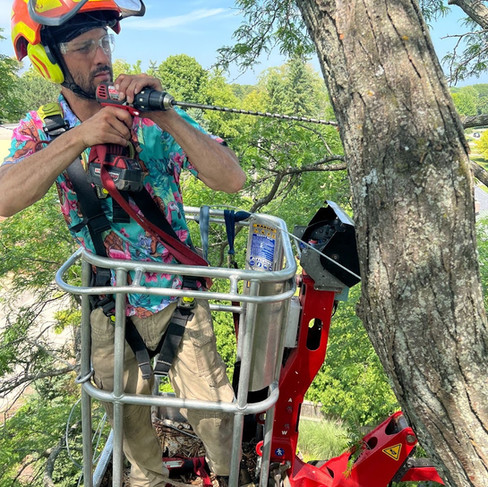Cabling Can Prolong the Life of Your Trees
- August Hoppe
- Aug 20, 2025
- 3 min read
Updated: Aug 25, 2025
The most common way a tree can be damaged in a strong storm is to fail at a branch or stem union. The areas where the stems come together are an inherent weak point in most trees. High winds and heavy snow cause greater force on branches, which can cause them to split and fail. With the help of professional support systems, like cabling and bracing, trees with weak unions can be made safer, healthier, and more resilient. At Hoppe Tree Service, we use tree cabling to support valuable trees that may otherwise be at risk of failure due to defects, age, or storm damage.
What is Tree Cabling?
Tree cabling is a technique used to provide extra support to weak or structurally compromised trees. It involves installing high-strength steel cables between major limbs or from a weak branch to a stronger one. The goal is to reduce the stress caused by high winds, heavy snow, or the tree's own weight, helping prevent limb breakage or total failure.
Most cables are placed at about 2/3rd's of the height of the union in the tree. Holes are drilled through each stem, and the cable is then placed through the holes. The stems are tensioned with straps or mechanical advantage, and the cables are tightened with special nuts. The tension is released, and the cable becomes tight, thus supporting the two stems.
Why Trees Might Need Cabling
Not every tree needs structural support, but there are a few common reasons we recommend it:

Structural Defects
Trees with weak branch unions, co-dominant stems, or cracks are more likely to split or fail -- especially under pressure from weather or gravity.
Older or Heritage Trees
Mature trees often have sentimental or historical value. Cabling can help extend the life of an aging tree by minimizing stress on weakened limbs or trunks.
Split or Storm-Damaged Trees
If a tree has already split or sustained damage from a storm, cabling may prevent further harm and allow the tree time to heal and stabilize.
High-Value or High-Risk Locations
Trees over homes, driveways, play areas, or other high-use spaces are ideal candidates for support systems if there are any structural concerns.

The Benefits of Tree Cabling
✔ Prolongs the Life of Your Tree
Support systems can extend the lifespan of a compromised tree by keeping it stable and strong.
✔ Protects Your Property and Loved Ones
Cabling reduces the risk of large limb failure, helping prevent damage or injury.
✔ Preserves Your Landscape's Beauty
Instead of removing a tree due to structural concerns, cabling provides a less invasive, preservation-minded solution.
✔ Cost-Effective Compared to Removal
In many cases, installing a cable system is a smart investment, avoiding the much higher cost of tree removal or emergency damage repairs.
Leave It to the Pros
Cabling isn't a one-size-fits-all fix. It requires a trained eye to assess the tree's health, identify weak points, and install the correct type of support system. Hoppe Tree Service's ISA Certified Arborists are experienced in evaluating structural issues and providing safe, long-lasting solutions.
Whether you're worried about a large split branch or want to protect a beloved old tree, we're here to help.
Think one of your trees might need extra support? Contact Hoppe Tree Service today to schedule a professional assessment. Our fall schedule fills quickly, so don't wait to secure your spot!
📞414-257-2111













